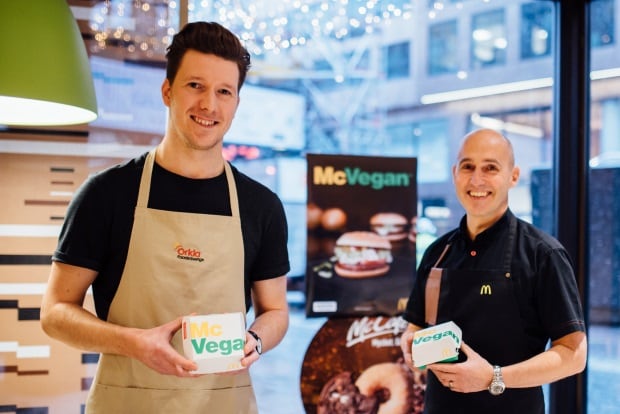In partnership with McDonald’s, Orkla’s Swedish vegan brand Anamma developed the burger to tap into the “strong trend” for plant-based foods.
The vegan patty, which was developed in Sweden, is based on protein from soybeans, the company revealed. Henrik Eriksson, director of food solutions at Orkla Foods Sverige, added that it has not been formulated specifically for Nordic tastes. “It is developed to be neutral and then it’s possible to add on different flavours,” he explained.
The McVegan burger proved a “huge success” when it was tested in a number of McDonald’s restaurants in Finland during the Autumn. It will become a regular menu item in McDonald’s 210 outlets across Sweden and 60 restaurants in Finland from 28 December.
"It is both fun and exciting that we have started this collaboration with Orkla Foods Sweden and their brand Anamma. That means we get to work with the best in the industry when it comes to vegan products, and that we can offer our guests a vegan burger developed in Sweden. Our ambition is that there should be something on our menu for all 400,000 guests visiting us every day, and with McVegan we are expanding our offer further," said Staffan Ekstam, head of food strategy at McDonald's.
Orkla and McDonalds will continue to work together to deliver product innovation, Eriksson told FoodNavigator. “McVegan is the first burger and marks the beginning of a new long-term collaboration, which can give us great opportunities to develop more new dishes and flavors. Now it becomes easier - for everyone - to choose a good vegan burger.”

Foodservice channel opportunity
Orkla has identified the food service channel as a growth opportunity for the group’s alternative protein products.
“It is indeed a strong opportunity for us as a food manufacturer within the food service sector to increase our offering of alternative protein through the food service channels,” Eriksson revealed.
In particular, he stressed that demographic trends mean a drive to increase meat-free options in out of home (OOH) consumption occasions is likely to be welcomed by consumers. “The younger population is well represented in the OOH eating sector. In this target group of younger consumers, the demand for vegan and alternative proteins is high due to their lifestyle and eating habits.”
According to Orkla consumer research, 10% of Swedish consumers are vegan but this number rises to approximately 20% of 15- to 29-year-olds. The Orkla Barometer survey also revealed that 50% of consumers in Sweden want to increase their consumption of vegetarian food. Orkla believes that this demand growth is driven by concerns about health and the environment.
Products made from alternative proteins have “less climate impact” than animal-based foods, the company noted.
“A strong focus in the Orkla overall strategy is to develop healthier food and drink where vegetarian is an important ingredient. Vegetarian and vegan is a strong trend, and more and more people want to eat more plant-based today,” Eriksson observed. “In our focus to offer healthy alternatives we, for example, have increased the amount of vegan and vegetarian food in our portfolio both in retail and food service sectors. [We also] work continuously in reducing the amount of sugar and salt in our products in order to improve the health among Swedish people.”
Eriksson is quick to emphasise that Orkla’s drive to deliver better-for-you products encompasses its entire product portfolio - not just Orkla's meat-free offering.
“It is important though to add that Orkla wishes to be 'your friend in everyday life' and offers good, tasty and healthy food for everyone. This incorporates both vegan, vegetarian as well as meat-based food.”

The opportunity to meet growing demand for alternative proteins and how to expand in growth channels are just two of the subjects we will be touching on at the Food Protein Vision conference in Amsterdam this March.
Powered by FoodNavigator, the conference will focus on growth opportunities in across the protein space as well as tackling key challenges such as sustainability and health. To find out more about the conference, click here.
